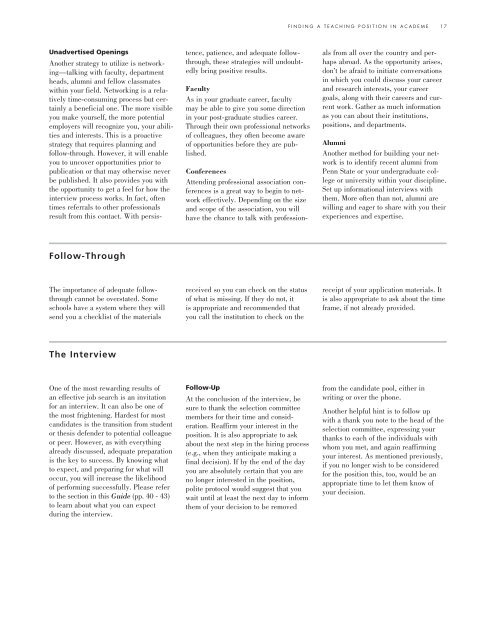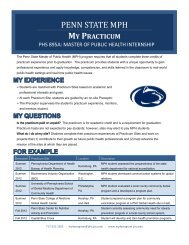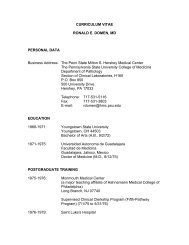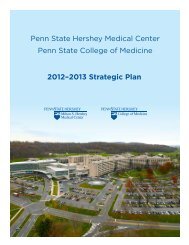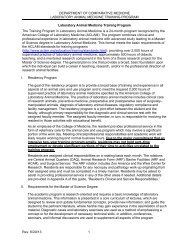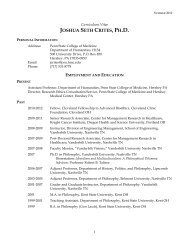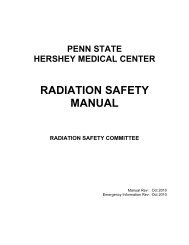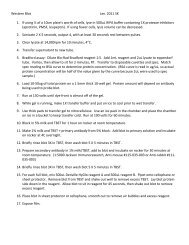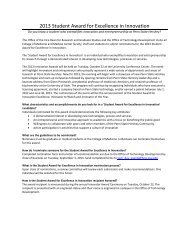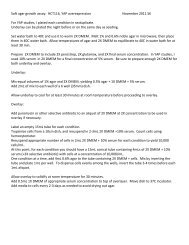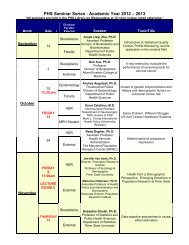Penn State Graduate Student Career Guide - Biomedical Sciences ...
Penn State Graduate Student Career Guide - Biomedical Sciences ...
Penn State Graduate Student Career Guide - Biomedical Sciences ...
You also want an ePaper? Increase the reach of your titles
YUMPU automatically turns print PDFs into web optimized ePapers that Google loves.
FINDING A TEACHING POSITION IN ACADEME 17<br />
Unadvertised Openings<br />
Another strategy to utilize is networking—talking<br />
with faculty, department<br />
heads, alumni and fellow classmates<br />
within your field. Networking is a relatively<br />
time-consuming process but certainly<br />
a beneficial one. The more visible<br />
you make yourself, the more potential<br />
employers will recognize you, your abilities<br />
and interests. This is a proactive<br />
strategy that requires planning and<br />
follow-through. However, it will enable<br />
you to uncover opportunities prior to<br />
publication or that may otherwise never<br />
be published. It also provides you with<br />
the opportunity to get a feel for how the<br />
interview process works. In fact, often<br />
times referrals to other professionals<br />
result from this contact. With persistence,<br />
patience, and adequate followthrough,<br />
these strategies will undoubtedly<br />
bring positive results.<br />
Faculty<br />
As in your graduate career, faculty<br />
may be able to give you some direction<br />
in your post-graduate studies career.<br />
Through their own professional networks<br />
of colleagues, they often become aware<br />
of opportunities before they are published.<br />
Conferences<br />
Attending professional association conferences<br />
is a great way to begin to network<br />
effectively. Depending on the size<br />
and scope of the association, you will<br />
have the chance to talk with professionals<br />
from all over the country and perhaps<br />
abroad. As the opportunity arises,<br />
don’t be afraid to initiate conversations<br />
in which you could discuss your career<br />
and research interests, your career<br />
goals, along with their careers and current<br />
work. Gather as much information<br />
as you can about their institutions,<br />
positions, and departments.<br />
Alumni<br />
Another method for building your network<br />
is to identify recent alumni from<br />
<strong>Penn</strong> <strong>State</strong> or your undergraduate college<br />
or university within your discipline.<br />
Set up informational interviews with<br />
them. More often than not, alumni are<br />
willing and eager to share with you their<br />
experiences and expertise.<br />
Follow-Through<br />
The importance of adequate followthrough<br />
cannot be overstated. Some<br />
schools have a system where they will<br />
send you a checklist of the materials<br />
received so you can check on the status<br />
of what is missing. If they do not, it<br />
is appropriate and recommended that<br />
you call the institution to check on the<br />
receipt of your application materials. It<br />
is also appropriate to ask about the time<br />
frame, if not already provided.<br />
The Interview<br />
One of the most rewarding results of<br />
an effective job search is an invitation<br />
for an interview. It can also be one of<br />
the most frightening. Hardest for most<br />
candidates is the transition from student<br />
or thesis defender to potential colleague<br />
or peer. However, as with everything<br />
already discussed, adequate preparation<br />
is the key to success. By knowing what<br />
to expect, and preparing for what will<br />
occur, you will increase the likelihood<br />
of performing successfully. Please refer<br />
to the section in this <strong>Guide</strong> (pp. 40 - 43)<br />
to learn about what you can expect<br />
during the interview.<br />
Follow-Up<br />
At the conclusion of the interview, be<br />
sure to thank the selection committee<br />
members for their time and consideration.<br />
Reaffirm your interest in the<br />
position. It is also appropriate to ask<br />
about the next step in the hiring process<br />
(e.g., when they anticipate making a<br />
final decision). If by the end of the day<br />
you are absolutely certain that you are<br />
no longer interested in the position,<br />
polite protocol would suggest that you<br />
wait until at least the next day to inform<br />
them of your decision to be removed<br />
from the candidate pool, either in<br />
writing or over the phone.<br />
Another helpful hint is to follow up<br />
with a thank you note to the head of the<br />
selection committee, expressing your<br />
thanks to each of the individuals with<br />
whom you met, and again reaffirming<br />
your interest. As mentioned previously,<br />
if you no longer wish to be considered<br />
for the position this, too, would be an<br />
appropriate time to let them know of<br />
your decision.


